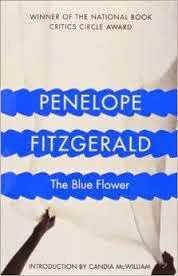
Penelope Fitzgerald gives us all hope that we haven’t left it too late. She only published her first book at the age of 58, but went on to win the Booker and be acclaimed one of the greatest writers of the twentieth century. THE BLUE FLOWER was her last novel and is considered one of her most successful. It is a re-telling of the brief life of the philosopher Novalis, who lived in Germany in the late eighteenth century.
It’s a brief book, just 223 pages (or 100%, as the Kindle helpfully tells me), but in that span Fitzgerald creates a really rich and full world of the past. Here, for example, is her description of those who come for charity of Christmas:
In Weissenfels there were only the town poor and the town mad, and later the girls with unwanted pregnancies, who could not afford the services of the Angel-maker, the back-street abortionist.
Or here’s the Christmas feast:
The servants had already brought inteh soups, one made of beer, sugar and eggs, one of rose-hips and onions, one of bread and cabbage-water, one of cows’ udders flavoured with nutmeg. There was dough mixed with beech-nut oil, pickled herrings and goose with treacle sauce, hard-boiled eggs, numerous dumplings.
I’m torn between the cabbage water and the udders. Or here’s Novalis’ mother, who is put through having a child a year, as did many unfortunate ladies of the period:
An extraordinary notion came to the Freifrau Auguste, that she might take advantage of this moment, which in its half darkness and fragrance seemed to her almost sacred, to talk to her eldest son about herself. All that she had to say could be put quite shortly: she was forty-five, and she did not see how she was going to get through the rest of her life
As Novalis only made it to 29, dying of TB along with eleven of his mother’s twelve children (she survived them all), the book focuses mostly on his one grand romance. At nineteen, he creepily fell in love with a twelve year old. He needed to wait till she was sixteen before he could marry her, but unfortunately TB took her at fifteen. Thank you so much Albert Schatz!
